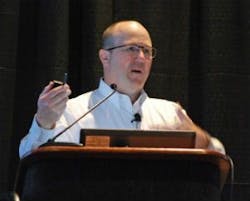"Increasing OEE by just 1% on an Oreo line can mean a lot of money, so this program paid for itself pretty quickly." Mondeléz's Bob Pegher shared how the company’s Integrated Digital Factory methodology has increasing OEE by 3-5% at a number of its North American production facilities.
Food and beverage manufacturers face many difficult and often conflicting challenges that can seem impossible to overcome. These include giving consumers all the new, cool and multiplying choices they want, but delivering them with increasing efficiency, decreasing costs, and shorter capital returns on investment (ROI) of 18-26 months or less, according to Dave Sharpe, global industry director, consumer packaged goods and life sciences, Rockwell Automation."Meanwhile, they’re also seeking improved asset utilization, increased yield, greater workforce productivity, optimized resource management, mitigated security risks and assured food safety," added Sharpe. "This is why we need to frame up the digitalization journey we're on—it's an inflection point for delivering unprecedented productivity to industry. This can include safe collaboration with robots and equipment, merging physical and virtual worlds, using artificial intelligence (AI) and machine learning to predict failures and reduce downtime, and employing wearable and mobile computing devices to transform workflows."
Mondeléz International is among the food and beverage companies facing these challenges with the support of Rockwell Automation. Bob Pegher, North American regional automation and controls manager, described how the company has begun to roll out a standardized data-enablement methodology across its global fleet of production facilities during the Food & Beverage Industry Forum at this week’s Automation Fair in Philadelphia.
Toward the Integrated Digital Factory
Mondeléz International has partnered with Rockwell Automation for many years and maintains a global strategic account, Pegher reported, which means it also gets the benefit of a dedicated Rockwell Automation team. All of these capabilities were needed when Mondeléz recently sought to implement standardized, data-enabled factory floors at 14 of its five- to 70-year-old plants in the U.S., Canada and Mexico. This 2017-18 project included more than 50 production lines, making biscuits, confections, gum and candy.
"We're committed to delivering best-in-class productivity, working with partners committed to our strategic goals, and changing our manufacturing environment," said Pegher. "These goals include implementing a standard quality system; standard machine performance reporting for global efficiency of production lines; improving machine and line performance to reduce waste; and empowering our workforce with a standard Integrated Lean Six Sigma (IL6S) team and daily management system."
Pegher added that different plants and production lines are at different levels of automation maturity, but they all need to get data out of their plant-floor machines, and deliver data to users for better decision-making. Mondeléz has worked with Rockwell Automation to define standard approaches in the following arenas:
- Industrial Ethernet network;
- Hosting environment for manufacturing;
- Critical control network and virtual local area network/Internet (VLAN/IP) schema;
- Methodology for collecting quality and machine performance data; and,
- Methodology for commissioning, qualification and validation.
"The scope of our project in North America focuses on our Integrated Digital Factory (IDF), which includes assessment and remediation for infrastructure readiness; quality system data and reporting; machine performance data and reporting; data enablement and validation; and integration with the ERP system," explained Pegher.
To determine each plant's needs, Rockwell Automaton network services engineers conducted control system audits at each facility, developed as-in assessments, and risk analyses, and drafted reports and recommendations. "Implementing a data-enabled factory floor begins with a solid foundation, which is the industrial Ethernet network," added Pegher.
Implementation details
Following its assessment and recommendations, Rockwell Automation installed Cisco WS-3850 fiber core switches, Cisco WS-2960 distribution layer switches, Allen-Bradley Stratix 5700 access layer switches, fiber and conduit between core and distribution switches, copper and conduit between distribution and access switches, and one line data concentrator per line or process area. These concentrators consist of a CompactLogix control system and Stratix switch in a NEMA-rated enclosure.
Similarly, the Mondeléz-designed hosting environment was housed in an industrial data center (IDC) based on Rockwell Automation's E3000 IDC. It included three Cisco servers, two Cisco switches, one EMC storage area network (SAN), one Eaton uninterruptible power supply (UPS), VMware VEEAM backup solution, and standard Mondeléz virtual machines (VM). The company bought and installed 15 in the past year.
To achieve IDF on new or existing lines, Pegher said that Mondeléz and Rockwell Automation also carried out a "data enablement" procedure, which included identifying workcells or unit operations; gathering and reviewing their PLC code; creating Excel workbook templates for documenting tag data; creating ladder logic in workcell PLCs and data concentrator PLCs; configuring an OPC server in the IDC; and installing PLC code, and testing and validating onsite and remotely.
"Mondeléz has specifications and standards for data enablement, which are also followed by our OEMs and system integrators to ensure consistency," explained Pegher. "It's also a critical requirement to comply with TR88 and PackML standard on machine states machine states as much as possible. We specify Rockwell Automation RAPID equipment interface, which is an add-on instruction subroutine inside ControlLogix, and provides a standard interface for different machines and their states, counts and faults."
Pegher added the IDF and data-enablement project has provided Mondeléz with:
- A standard, consistent network infrastructure across North America;
- A standard, consistent data collection method;
- Real-time, automated quality data from machines and processes for its quality teams; and,
- Cost-effective service from local and global Rockwell Automation engineers.
Overall, Pegher reported that Mondeléz's data-enabled factory floor program has improved its overall equipment effectiveness (OEE) by 3-5%, which means OEE for a typical machine would increase from 79% to abut 83%.
"Increasing OEE by just 1% on an Oreo line can mean a lot of money, so this program paid for itself pretty quickly," Pegher added. "This isn't rocket science. You just need a consistent method and plan, and then stick with it.”
The editors of Control are on-site at Automation Fair 2018 to bring you breaking news, innovations and insights from the event. Once the event is over, they will put together a report featuring the top news. Pre-order your copy today.







